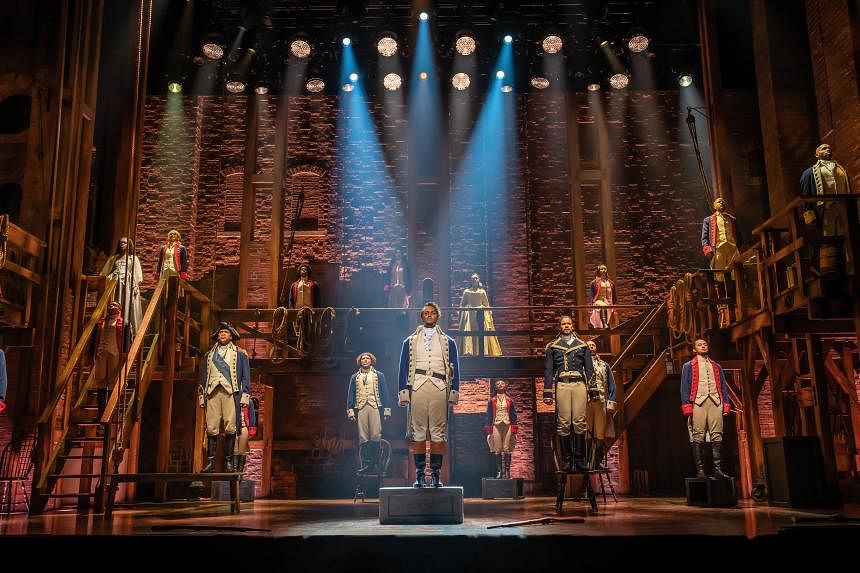MANILA – Singapore’s theatre scene will be abuzz with American history from April 19, when the Tony-winning musical Hamilton arrives in the Republic for the first time.
The production – which premiered on Broadway in 2015 with book, music and lyrics by American multi-hyphenate Lin-Manuel Miranda – tells the story of American founding father Alexander Hamilton (1757 to 1804). He will be played by Australian actor Jason Arrow on the international tour.
An immigrant from the West Indies, he played a key role in the American Revolution (1775 to 1783), during which Great Britain’s North American colonies won political independence and went on to form the United States of America.
The sung-and-rapped musical has a score that draws heavily from hip-hop, jazz and R&B, as well as traditional show tunes.
The Straits Times caught a performance of Hamilton when it was staged in Manila, the Philippines, in November 2023. It is now playing in Abu Dhabi until February, before coming to the Lion City.
Due to overwhelming demand, the Singapore season has been extended for an additional two weeks, until June 9.
Given the quick pacing, dense subject and the fact that much of the dialogue works on both literal and symbolic levels, Hamilton may be hard to grasp for first-time audiences.
Here is ST’s guide to eight themes explored in the musical.
1. Rising up
One key motif involves the characters, such as Hamilton, wanting to climb the social ladder.
The protagonist was born out of wedlock on the British island of Nevis in the Caribbean. His father, a Scotsman, abandoned the family in 1766 and his mother, described as a “whore”, died in 1768, leaving him an orphan.
The musical’s opening number, Alexander Hamilton, references Hamilton’s unfortunate start in life. But, despite growing up in squalor, he rises to become a hero and scholar. He does so through hard work, intelligence and a hunger to be better.
In 1773, he is sent to King’s College – now known as Columbia University – in New York, a hotbed of political and revolutionary activity.
2. Shaky alliances
It is not always easy to tell friend from foe. And in Hamilton, former allies can turn against one another. Some characters also equivocate rather than say what is on their mind, out of fear that voicing one’s opinion can cause serious trouble down the road.
On July 4, 1776, the United States of America is newly proclaimed by the Continental Congress through the Declaration of Independence, severing their political connections to Great Britain.
That same year, a 19-year-old Hamilton meets Aaron Burr in New York and strikes up a friendship with the fellow orphan. But the audience learns that Burr will eventually fire a gun at Hamilton.
In the song Aaron Burr, Sir, this tentative approach to allegiances can be detected in Burr’s famous piece of advice to Hamilton – “talk less, smile more”.
However, the reluctance to stand for anything will also have its drawbacks, as explored later in the song, The Room Where It Happens.
3. Fighting for one’s beliefs
The characters in Hamilton know full well that opportunities are limited and hard to come by. When circumstances present themselves, one must seize the moment.
This notion is explored in the show-stopping anthem My Shot, when Hamilton shares with his fellow revolutionaries his vision of America as an independent colony.
These peers also have their own dreams. Marquis de Lafayette, a Frenchman, dislikes being under a monarch’s rule, while Hercules Mulligan, a tailor’s apprentice, aims to advance socially. John Laurens, an abolitionist, wants equal rights for all and hopes to one day be part of the first all-black US battalion.
Described as “young, scrappy and hungry”, these revolutionaries are positioned as underdogs grabbing hold of the chance to fight for their freedom and place in history.
4. Women’s rights
Women are becoming more educated and assertive in the 18th century. The excitement felt over this development is expressed mainly through Angelica, Eliza and Peggy, the three daughters of General Philip Schuyler from the Revolutionary War Army.
In the song The Schuyler Sisters, the witty, forward-looking eldest sister Angelica marvels at the new revolutionary ideas and espouses gender equality. The softer, more demure middle sister Eliza proclaims how lucky they are to be alive in that time and place, while youngest sister Peggy expresses more conservative ideas, such as an aversion to war and following her father’s instructions.
Although there is still some way to go for female empowerment, the ladies nonetheless hold New York up as “the greatest city in the world”.
5. Fear of failure
What if the American Revolution fails? That is the subject of the satirical song You’ll Be Back, performed by a smug King George III, who was king of Great Britain from 1760 to 1820.
It features the egoistic monarch gleefully foretelling the quashing of the rebellion, and predicting how the American colonists will crawl back to Great Britain. Peppered with snide claims that the colonists “belong” to him, the taunting number provides comic relief, but also serves as a reminder of the grim consequences should the revolution not succeed.
6. Power and its costs
In 1777, Hamilton is appointed lieutenant colonel and aide-de-camp to George Washington, then the commander-in-chief of the Revolutionary War Army who will later become the first president of the United States.
The song Right Hand Man, which recounts Hamilton’s appointment, reveals that his way of fulfilling his ambitions and aspirations is through attaining power and fighting wars.
However, success has its price. Burr also applies for the role of aide-de-camp, but is passed over in favour of Hamilton. This snub sows seeds of jealousy and discontent between the two, an idea which is developed further in Wait For It – with deadly consequences.
7. Love comforts
Eliza marries Hamilton in 1780. The R&B number Helpless centres on their meeting at a ball where the Revolutionary War Army was stationed that year, followed by their courtship and wedding. The sweet love song reveals Hamilton’s insecurities over his lack of wealth and station, but also how these feelings of inadequacy are alleviated by Eliza’s love and trust.
Helpless also explores her interest in and devotion to Hamilton. It takes the audience through a roller coaster of emotions – from the nervousness at their first meeting, panic when Hamilton asks her father for her hand, and joy when looking into his eyes. Fidelity and family will continue to be key motivations for the musical’s characters.
8. Honour and reputation
One’s honour and reputation are paramount in Hamilton. So when a dispute emerges, characters challenge one another to duels to resolve their differences.
One such fight takes place in 1778 between John Laurens and Charles Lee, a major general in the Revolutionary War Army who makes disparaging remarks about George Washington. Laurens, one of Washington’s aides, takes offence at these comments.
The hip-hop number Ten Duel Commandments details the way these duels are carried out, from getting some pistols and a doctor, to leaving a note for one’s next of kin.
Book it / Hamilton
Where: Sands Theatre, Marina Bay Sands, 10 Bayfront Avenue
When: April 19 to June 9, 8pm (Tuesdays to Fridays), 2 and 8pm (Saturdays), 1 and 6.30pm (Sundays)
Admission: $80 to $300 via Marina Bay Sands’ website (str.sg/iNDG), Sistic (go to sistic.com.sg or call 6348-5555) and Klook (str.sg/iNDp)


